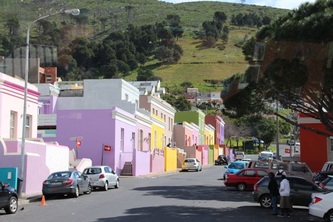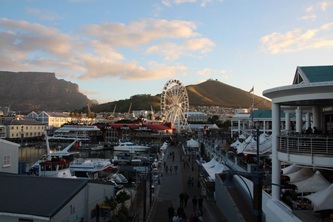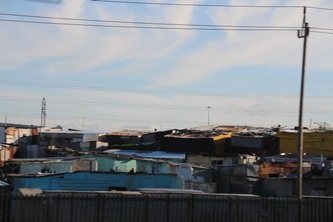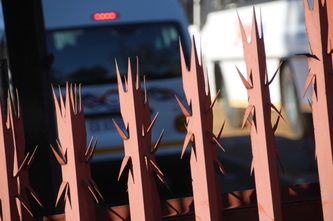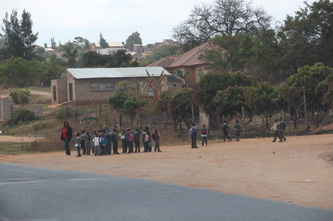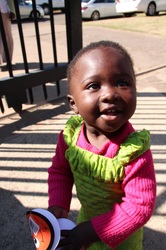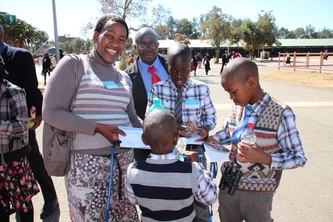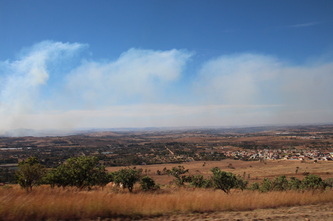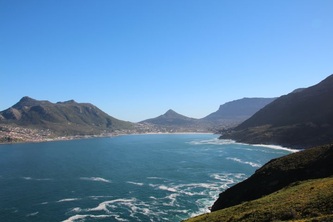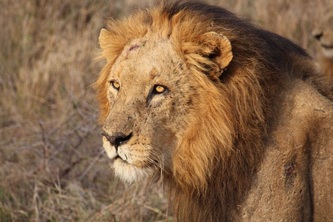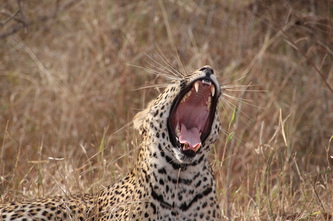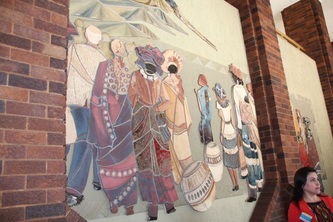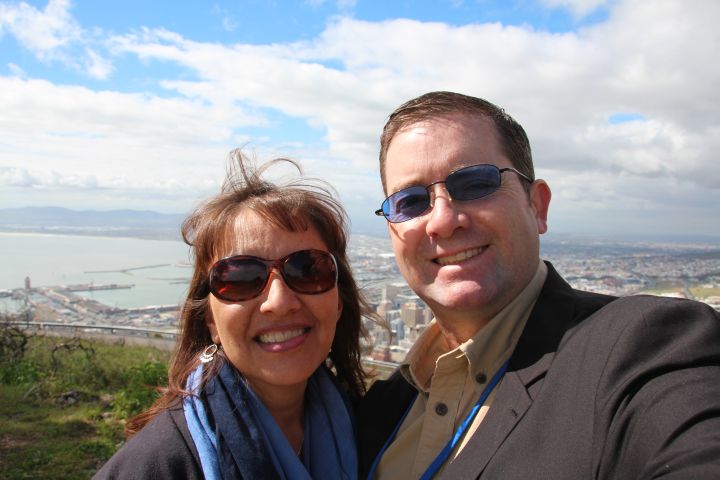We have found South Africa a very diverse and interesting country. We really didn't know what to expect and we didn't come with any preconceived ideas. We really don't hear that much in the U.S. news media about Africa unless it is a major event. Things here are very complex and we really can't understand everything in just two weeks. But we did talk to a lot of locals and tried to get their perspective.The following are our impressions...
SIMILARITIES: Many things here are very similar to home. You see many of the same brands esp. automobiles. The food & clothing styles are similar. Of course there are McDonalds everywhere but we saw twice as many KFCs. Most everyone speaks English and traffic signs, etc, are all in English making it a comparatively easy country to navigate.
APARTHEID: South Africa is known for their past history of apartheid. But people generally don't want to talk about the "A" word. It is understandably a sensitive topic and still in recent memory. Most wish to leave it in the past but it definitely affects the present. It was an oppressive time - blacks did not have a choice of where they could live - even whole cities like Pretoria were "white only". Workers could come into the city to work and they could live outside the city in government provided apartments or shanty towns but they were not allowed to bring their families for ten years. Blacks, "colored" (people of mixed heritage), & Indians needed papers like passports to go into white areas. Inequality was the way of life.
This applied to all aspects of life. It was against the law for whites and blacks to meet together at all. So by law, our congregations & Branch office had to be racially separate or our brothers would face imprisonment or worse. But our spiritual brothers found clever ways around this. For example, if there was to be a wedding, the black brothers & sisters would come dressed in black & white so they looked like wait staff. The neighbors would not report this to the authorities because it looked like something they were used to - blacks serving whites at a wedding. White South Africans we talked to are not proud of the past and are hopeful for a better future.
CURRENT PROBLEMS: But one set of problems and injustices have been traded for another set of problems. Whites and blacks we talked to are unhappy with the economy and most unhappy are with their government. Unemployment is very high 30-40% - some areas up to 50%-60%. Thus homelessness & crime are very high. There is no welfare system. There is a well-documented corruption in the government. A lot of people have moved to South Africa from surrounding countries hoping for work or to escape civil war or poverty in their country but this adds to the homelessness & crime.
CRIME: Johannesburg & Pretoria are the first cities we've ever visited where we were advised not to go out during the day unless we were in a large group or with locals and never go out at night. Only take taxis that were called for us by the hotel so as not to be robbed or kidnapped by a fake cabbie. Every home & business (both in nice neighborhoods & poor neighborhoods) is surrounded by high walls or fences topped with spikes, barbed wire, razor wire and/or electric wire at the top. Homes display signs showing they are protected by armed response units.
We did notice that we saw very little graffiti. Jo'Burg & Pretoria had a lot of litter but Cape Town was relatively clean. The highways, airports and other infrastructure in the cities are very modern. Less so in the rural areas but that is similar to the U.S.
CAPE TOWN: Cape Town was a beautiful city. The homes were not fortified like in JoBurg & Pretoria. We did walk around the city center and the waterfront by ourselves during the day & felt relatively safe.
TOWNSHIPS: Many black South Africans live in "Townships" or shanty-towns. Rows upon rows of shacks are built of scrap tin or wood with tin roofs, dirt floors, no running water and no electricity. The P.C. words to call these are "temporary housing" or "informal housing" or just "townships". The Soweto township near Johannesburg has over 2 million people and one in Cape Town has 1.5 million people living within and there are many townships around the large cities. The government is trying to build permanent housing (small cinder block houses) and move township people into them but it is a slow process and people who apply wait years or are rejected.
EMPLOYMENT: The government does hire laborers for all kinds of tasks - in some areas instead of parking meters you pay a parking attendant or instead of using equipment to dig a trench, laborers are used. We found attendants in most public restrooms (in airports, state parks, etc) which does mean the bathrooms are kept very clean. This does give some work to some people but they don't get paid much - avg. wage is $7-$8 per DAY.
CLASS DISPARITIES: We did notice very clearly the large disparity between the classes - the "haves" & the "have nots". At the airports, most travelers are white and workers are black. At restaurants, most patrons are white and most workers are black. But at the mall, you see all races. Blacks have most of the hard labor & menial jobs.
Generally whites have a higher standard of living. But everyone was affected by the recession and a white brother we talked to has been unemployed since 2009 except for odd jobs. Plus it is hard to get a job if you are white due to policy changes/laws kind of like affirmative action in the US but to a greater extreme.
Over 40% of the population live in extreme poverty living on an average of $2 per day.
DIVERSITY: There are 11 official languages in South Africa: 9 tribal languages, Afrikaans (spoken by descendants of the white Dutch settlers who arrrived in the 1600s), and English - which is the universal language. Most signs are in English and most everyone we met spoke English with cool accents sounding a little British or Australian or Jamacian. But they said they like our American accents - who knew we could sound cool?
A large community of Indians (dot not feather) live in South Africa. Workers came from India generations ago and their descendants live here. Thus we ate lots delicious Indian food. Curry - mmmmm!
There is a fairly large Muslim community here too. Back in the 1700s & 1800s when there was slavery a lot of slaves were brought from Mayalsia and Indonesia. After receiving their freedom, many settled in the colorful BoKaap area in Cape Town.
Many immigrants are moving to South Africa from surrounding African countries due to civil war, famine, & poverty. Thus there are people who speak Portuguese, French and native languages. (The European languages are due to the surrounding countries being under colonial rule for centuries.)
Despite all the challenges, our dear spiritual brothers and sisters of all races are doing an amazing job of taking care of all different language groups, immigrants, refugees from disaster areas, and building much needed Halls in their varied ministry. It's been a real eye opener for us - so very different from home.
SOUTH AFRICANS: Generally speaking we have found South Africans (of all backgrounds) to be warm, kind and very polite. Mike actually looks like a white South African - the first day we were here the driver started speaking Afrikaans to him until Mike gave him a confused look and then he switched to English. I don't think people knew where to place me as far as ethnicity. But those who found out I am half Native American were thrilled to find that out - I am a minor celebrity here now. :-)
The country is beautiful and we have enjoyed our visit here very much. We enjoyed getting to know many local people of many different backgrounds especially our spiritual brothers and sisters who were so loving, caring and giving. We would love to come back someday and do some of the many things we wanted to do but ran out of time. And to visit again with the many friends we have made along the way.
It has been an absolutely amazing experience!
SIMILARITIES: Many things here are very similar to home. You see many of the same brands esp. automobiles. The food & clothing styles are similar. Of course there are McDonalds everywhere but we saw twice as many KFCs. Most everyone speaks English and traffic signs, etc, are all in English making it a comparatively easy country to navigate.
APARTHEID: South Africa is known for their past history of apartheid. But people generally don't want to talk about the "A" word. It is understandably a sensitive topic and still in recent memory. Most wish to leave it in the past but it definitely affects the present. It was an oppressive time - blacks did not have a choice of where they could live - even whole cities like Pretoria were "white only". Workers could come into the city to work and they could live outside the city in government provided apartments or shanty towns but they were not allowed to bring their families for ten years. Blacks, "colored" (people of mixed heritage), & Indians needed papers like passports to go into white areas. Inequality was the way of life.
This applied to all aspects of life. It was against the law for whites and blacks to meet together at all. So by law, our congregations & Branch office had to be racially separate or our brothers would face imprisonment or worse. But our spiritual brothers found clever ways around this. For example, if there was to be a wedding, the black brothers & sisters would come dressed in black & white so they looked like wait staff. The neighbors would not report this to the authorities because it looked like something they were used to - blacks serving whites at a wedding. White South Africans we talked to are not proud of the past and are hopeful for a better future.
CURRENT PROBLEMS: But one set of problems and injustices have been traded for another set of problems. Whites and blacks we talked to are unhappy with the economy and most unhappy are with their government. Unemployment is very high 30-40% - some areas up to 50%-60%. Thus homelessness & crime are very high. There is no welfare system. There is a well-documented corruption in the government. A lot of people have moved to South Africa from surrounding countries hoping for work or to escape civil war or poverty in their country but this adds to the homelessness & crime.
CRIME: Johannesburg & Pretoria are the first cities we've ever visited where we were advised not to go out during the day unless we were in a large group or with locals and never go out at night. Only take taxis that were called for us by the hotel so as not to be robbed or kidnapped by a fake cabbie. Every home & business (both in nice neighborhoods & poor neighborhoods) is surrounded by high walls or fences topped with spikes, barbed wire, razor wire and/or electric wire at the top. Homes display signs showing they are protected by armed response units.
We did notice that we saw very little graffiti. Jo'Burg & Pretoria had a lot of litter but Cape Town was relatively clean. The highways, airports and other infrastructure in the cities are very modern. Less so in the rural areas but that is similar to the U.S.
CAPE TOWN: Cape Town was a beautiful city. The homes were not fortified like in JoBurg & Pretoria. We did walk around the city center and the waterfront by ourselves during the day & felt relatively safe.
TOWNSHIPS: Many black South Africans live in "Townships" or shanty-towns. Rows upon rows of shacks are built of scrap tin or wood with tin roofs, dirt floors, no running water and no electricity. The P.C. words to call these are "temporary housing" or "informal housing" or just "townships". The Soweto township near Johannesburg has over 2 million people and one in Cape Town has 1.5 million people living within and there are many townships around the large cities. The government is trying to build permanent housing (small cinder block houses) and move township people into them but it is a slow process and people who apply wait years or are rejected.
EMPLOYMENT: The government does hire laborers for all kinds of tasks - in some areas instead of parking meters you pay a parking attendant or instead of using equipment to dig a trench, laborers are used. We found attendants in most public restrooms (in airports, state parks, etc) which does mean the bathrooms are kept very clean. This does give some work to some people but they don't get paid much - avg. wage is $7-$8 per DAY.
CLASS DISPARITIES: We did notice very clearly the large disparity between the classes - the "haves" & the "have nots". At the airports, most travelers are white and workers are black. At restaurants, most patrons are white and most workers are black. But at the mall, you see all races. Blacks have most of the hard labor & menial jobs.
Generally whites have a higher standard of living. But everyone was affected by the recession and a white brother we talked to has been unemployed since 2009 except for odd jobs. Plus it is hard to get a job if you are white due to policy changes/laws kind of like affirmative action in the US but to a greater extreme.
Over 40% of the population live in extreme poverty living on an average of $2 per day.
DIVERSITY: There are 11 official languages in South Africa: 9 tribal languages, Afrikaans (spoken by descendants of the white Dutch settlers who arrrived in the 1600s), and English - which is the universal language. Most signs are in English and most everyone we met spoke English with cool accents sounding a little British or Australian or Jamacian. But they said they like our American accents - who knew we could sound cool?
A large community of Indians (dot not feather) live in South Africa. Workers came from India generations ago and their descendants live here. Thus we ate lots delicious Indian food. Curry - mmmmm!
There is a fairly large Muslim community here too. Back in the 1700s & 1800s when there was slavery a lot of slaves were brought from Mayalsia and Indonesia. After receiving their freedom, many settled in the colorful BoKaap area in Cape Town.
Many immigrants are moving to South Africa from surrounding African countries due to civil war, famine, & poverty. Thus there are people who speak Portuguese, French and native languages. (The European languages are due to the surrounding countries being under colonial rule for centuries.)
Despite all the challenges, our dear spiritual brothers and sisters of all races are doing an amazing job of taking care of all different language groups, immigrants, refugees from disaster areas, and building much needed Halls in their varied ministry. It's been a real eye opener for us - so very different from home.
SOUTH AFRICANS: Generally speaking we have found South Africans (of all backgrounds) to be warm, kind and very polite. Mike actually looks like a white South African - the first day we were here the driver started speaking Afrikaans to him until Mike gave him a confused look and then he switched to English. I don't think people knew where to place me as far as ethnicity. But those who found out I am half Native American were thrilled to find that out - I am a minor celebrity here now. :-)
The country is beautiful and we have enjoyed our visit here very much. We enjoyed getting to know many local people of many different backgrounds especially our spiritual brothers and sisters who were so loving, caring and giving. We would love to come back someday and do some of the many things we wanted to do but ran out of time. And to visit again with the many friends we have made along the way.
It has been an absolutely amazing experience!
